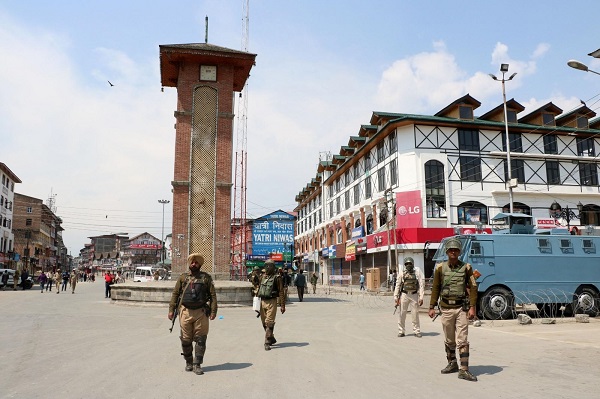Geneva, In its desperate attempt to internationalise the issue of Jammu and Kashmir, Pakistan on Tuesday submitted a 115-page “dossier” to the UN Human Rights Commission (UNHRC), which contained wild and unsubstantiated allegations about the situation there.
In the document, 35 pages have been devoted to history and the current situation in Kashmir, which Pakistan itself admits is based on “scantily available information”. The rest 80 pages, in the form of an annexure, contain photographs of some funerals, protests and apprehension of separatist leaders like Yasin Malik.
The annexure also has some list of “innocent” people, which Pakistan claims were killed. It, however, does not specify how they were killed and whether they were victims of terrorists.
It also attempts to mask its interference in Kashmir, including sponsoring and nurturing of terrorism, by claiming that India has blamed groups like Lashkar-e-Taiba for attacks but “never provided concrete evidence”. This flies in the face of facts as India has given several dossiers to Pakistan, detailing evidence, particularly after the attacks on Parliament in 2001 and in Mumbai in 2008.
To target the Indian government, the dossier cites critical comments made by Congress leader Rahul Gandhi, National Conference leader Omar Abdullah, PDP chief Mehbooba Mufti, Nobel laureate Amartya Sen, former member of Sonia Gandhi-led National Advisory Council (NAC) Jean Dreze, Left activist Kavita Krishnan and author Arundhati Roy.
“This humble compilation based on scantily available information from IOJK till 25 August 2019 merits widest circulation leading to a strong global pressure on the Government of India to abide by United Nations Security Council Resolutions and fulfilling its own decades-old promises such as, made by India’s first Prime Minister Pandit Jawaharlal Nehru in January 1952,” the Pakistani document says.
It alleges that “India is using diversionary tactics, disinformation and obfuscation of facts and events to create a smokescreen over violation of basic human rights of people in IOJK”.
Pakistan, in the document, claims that the special status of Jammu and Kashmir was abolished because the RSS wants to change the demography there.
“Desperate under the influence of Rashtriya Swayam Sewaksangh (RSS)/Hindu fundamentalists to change the demography of IOJK and strengthen the hold of central government in Kashmir affairs. In order to materialize these ambitions; India has recently abrogated Article 370 of Indian Constitution which gives special status to IOJK in all matters except communications, defence and foreign affairs, and Article 35 A which gave IOJK legislature the power to define the state’s permanent residents,” the document says.
It says India is using its economic and diplomatic strength to promote its stance on Kashmir and has made Hurriyat leadership “totally irrelevant” with a “view to permanently sideline them”.
The document also talks about ceasefire violations on the Line of Control (LoC) and International Border, for which it accuses India, without admitting its role and provocations.
Pakistan has displayed ample frustration ever since the government of India ended special status granted to Jammu and Kashmir under Article 370 early last month.
The document also quotes statements made by human rights organizations, Organisation of Islamic Cooperation (OIC) and some others to browbeat India.
Quoting Lord Eric Avebury, an English politician and human rights campaigner, the document says, “the atrocities committed by Indian imperialists in occupied Kashmir surpass brutalities of apartheid regime in South Africa or of Nazis 50 years ago”.
In conclusion, the document says, “The United Nations should urge India for an immediate halt to the bloodshed and for an independent and comprehensive investigation into HRVs, the brutality against innocent Kashmiris, as well as lack of access to justice for the victims by the Indian occupation forces. It is time that UN should take proactive measures to prevent further excesses of the victims, duly guided by universal morals & values and charter of the United Nations.”










